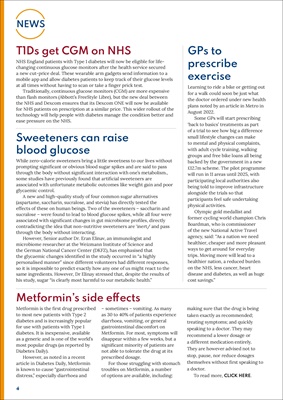
4
NEWS
T1Ds get CGM on NHS
NHS England patients with Type 1 diabetes will now be eligible for lifechanging
continuous glucose monitors after the health service secured
a new cut-price deal. These wearable arm gadgets send information to a
mobile app and allow diabetes patients to keep track of their glucose levels
at all times without having to scan or take a finger prick test.
Traditionally, continuous glucose monitors (CGM) are more expensive
than flash monitors (Abbott's FreeStyle Libre), but the new deal between
the NHS and Dexcom ensures that its Dexcom ONE will now be available
for NHS patients on prescription at a similar price. This wider rollout of the
technology will help people with diabetes manage the condition better and
ease pressure on the NHS.
GPs to
prescribe
exercise
Learning to ride a bike or getting out
for a walk could soon be just what
the doctor ordered under new health
plans noted by an article in Metro in
August 2022.
Some GPs will start prescribing
'back to basics' treatments as part
of a trial to see how big a difference
small lifestyle changes can make
to mental and physical complaints,
with adult cycle training, walking
groups and free bike loans all being
backed by the government in a new
£12.7m scheme. The pilot programme
will run in 11 areas until 2025, with
participating local authorities also
being told to improve infrastructure
alongside the trials so that
participants feel safe undertaking
physical activities.
Olympic gold medallist and
former cycling world champion Chris
Boardman, who is commissioner
of the new National Active Travel
agency, said: "As a nation we need
healthier, cheaper and more pleasant
ways to get around for everyday
trips. Moving more will lead to a
healthier nation, a reduced burden
on the NHS, less cancer, heart
disease and diabetes, as well as huge
cost savings."
Sweeteners can raise
blood glucose
While zero-calorie sweeteners bring a little sweetness to our lives without
prompting significant or obvious blood sugar spikes and are said to pass
through the body without significant interaction with one's metabolism.,
some studies have previously found that artificial sweeteners are
associated with unfortunate metabolic outcomes like weight gain and poor
glycaemic control.
A new and high-quality study of four common sugar alternatives
(aspartame, saccharin, sucralose, and stevia) has directly tested the
effects of these on human beings. Two of the sweeteners - saccharin and
sucralose - were found to lead to blood glucose spikes, while all four were
associated with significant changes in gut microbiome profiles, directly
contradicting the idea that non-nutritive sweeteners are 'inert/ and pass
through the body without interacting.
However, Senior author Dr. Eran Elinav, an immunologist and
microbiome researcher at the Weizmann Institute of Science and
the German National Cancer Center (DKFZ), has emphasised that
the glycaemic changes identified in the study occurred in "a highly
personalised manner" since different volunteers had different responses,
so it is impossible to predict exactly how any one of us might react to the
same ingredients. However, Dr Elinay stressed that, despite the results of
his study, sugar "is clearly most harmful to our metabolic health."
Metformin's side effects
Metformin is the first drug prescribed
to most new patients with Type 2
diabetes and is increasingly popular
for use with patients with Type 1
diabetes. It is inexpensive, available
as a generic and is one of the world's
most popular drugs (as reported by
Diabetes Daily).
However, as noted in a recent
article in Diabetes Daily, Metformin
is known to cause "gastrointestinal
distress," especially diarrhoea and
- sometimes - vomiting. As many
as 30 to 40% of patients experience
diarrhoea, vomiting, or general
gastrointestinal discomfort on
Metformin. For most, symptoms will
disappear within a few weeks, but a
significant minority of patients are
not able to tolerate the drug at its
prescribed dosage.
For those struggling with stomach
troubles on Metformin, a number
of options are available, including:
making sure that the drug is being
taken exactly as recommended;
treating symptoms; and quickly
speaking to a doctor. They may
recommend a lower dosage or
a different medication entirely.
They are however advised not to
stop, pause, nor reduce dosages
themselves without first speaking to
a doctor.
To read more, CLICK HERE.